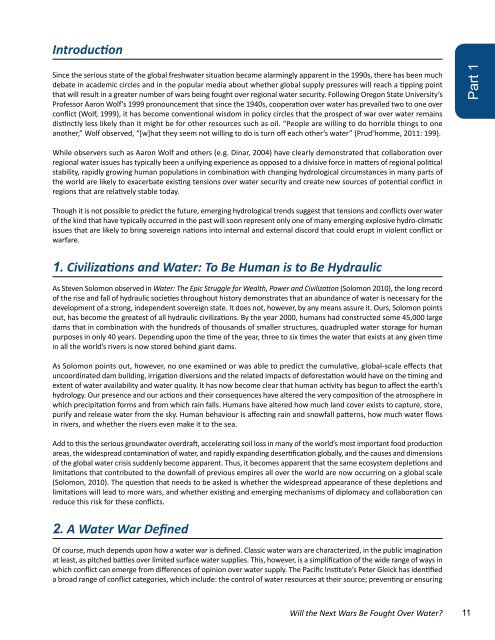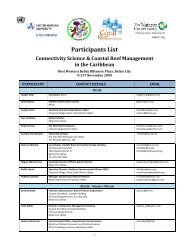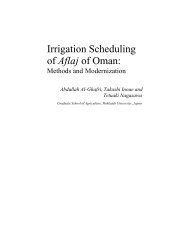The Global Water Crisis: Addressing an Urgent Security - Unu-inweh ...
The Global Water Crisis: Addressing an Urgent Security - Unu-inweh ...
The Global Water Crisis: Addressing an Urgent Security - Unu-inweh ...
Create successful ePaper yourself
Turn your PDF publications into a flip-book with our unique Google optimized e-Paper software.
Introduction<br />
Since the serious state of the global freshwater situation became alarmingly apparent in the 1990s, there has been much<br />
debate in academic circles <strong>an</strong>d in the popular media about whether global supply pressures will reach a tipping point<br />
that will result in a greater number of wars being fought over regional water security. Following Oregon State University’s<br />
Professor Aaron Wolf’s 1999 pronouncement that since the 1940s, cooperation over water has prevailed two to one over<br />
conflict (Wolf, 1999), it has become conventional wisdom in policy circles that the prospect of war over water remains<br />
distinctly less likely th<strong>an</strong> it might be for other resources such as oil. “People are willing to do horrible things to one<br />
<strong>an</strong>other,” Wolf observed, “[w]hat they seem not willing to do is turn off each other’s water” (Prud’homme, 2011: 199).<br />
While observers such as Aaron Wolf <strong>an</strong>d others (e.g. Dinar, 2004) have clearly demonstrated that collaboration over<br />
regional water issues has typically been a unifying experience as opposed to a divisive force in matters of regional political<br />
stability, rapidly growing hum<strong>an</strong> populations in combination with ch<strong>an</strong>ging hydrological circumst<strong>an</strong>ces in m<strong>an</strong>y parts of<br />
the world are likely to exacerbate existing tensions over water security <strong>an</strong>d create new sources of potential conflict in<br />
regions that are relatively stable today.<br />
Though it is not possible to predict the future, emerging hydrological trends suggest that tensions <strong>an</strong>d conflicts over water<br />
of the kind that have typically occurred in the past will soon represent only one of m<strong>an</strong>y emerging explosive hydro-climatic<br />
issues that are likely to bring sovereign nations into internal <strong>an</strong>d external discord that could erupt in violent conflict or<br />
warfare.<br />
1. Civilizations <strong>an</strong>d <strong>Water</strong>: To Be Hum<strong>an</strong> is to Be Hydraulic<br />
As Steven Solomon observed in <strong>Water</strong>: <strong>The</strong> Epic Struggle for Wealth, Power <strong>an</strong>d Civilization (Solomon 2010), the long record<br />
of the rise <strong>an</strong>d fall of hydraulic societies throughout history demonstrates that <strong>an</strong> abund<strong>an</strong>ce of water is necessary for the<br />
development of a strong, independent sovereign state. It does not, however, by <strong>an</strong>y me<strong>an</strong>s assure it. Ours, Solomon points<br />
out, has become the greatest of all hydraulic civilizations. By the year 2000, hum<strong>an</strong>s had constructed some 45,000 large<br />
dams that in combination with the hundreds of thous<strong>an</strong>ds of smaller structures, quadrupled water storage for hum<strong>an</strong><br />
purposes in only 40 years. Depending upon the time of the year, three to six times the water that exists at <strong>an</strong>y given time<br />
in all the world’s rivers is now stored behind gi<strong>an</strong>t dams.<br />
As Solomon points out, however, no one examined or was able to predict the cumulative, global-scale effects that<br />
uncoordinated dam building, irrigation diversions <strong>an</strong>d the related impacts of deforestation would have on the timing <strong>an</strong>d<br />
extent of water availability <strong>an</strong>d water quality. It has now become clear that hum<strong>an</strong> activity has begun to affect the earth’s<br />
hydrology. Our presence <strong>an</strong>d our actions <strong>an</strong>d their consequences have altered the very composition of the atmosphere in<br />
which precipitation forms <strong>an</strong>d from which rain falls. Hum<strong>an</strong>s have altered how much l<strong>an</strong>d cover exists to capture, store,<br />
purify <strong>an</strong>d release water from the sky. Hum<strong>an</strong> behaviour is affecting rain <strong>an</strong>d snowfall patterns, how much water flows<br />
in rivers, <strong>an</strong>d whether the rivers even make it to the sea.<br />
Add to this the serious groundwater overdraft, accelerating soil loss in m<strong>an</strong>y of the world’s most import<strong>an</strong>t food production<br />
areas, the widespread contamination of water, <strong>an</strong>d rapidly exp<strong>an</strong>ding desertification globally, <strong>an</strong>d the causes <strong>an</strong>d dimensions<br />
of the global water crisis suddenly become apparent. Thus, it becomes apparent that the same ecosystem depletions <strong>an</strong>d<br />
limitations that contributed to the downfall of previous empires all over the world are now occurring on a global scale<br />
(Solomon, 2010). <strong>The</strong> question that needs to be asked is whether the widespread appear<strong>an</strong>ce of these depletions <strong>an</strong>d<br />
limitations will lead to more wars, <strong>an</strong>d whether existing <strong>an</strong>d emerging mech<strong>an</strong>isms of diplomacy <strong>an</strong>d collaboration c<strong>an</strong><br />
reduce this risk for these conflicts.<br />
2. A <strong>Water</strong> War Defined<br />
Of course, much depends upon how a water war is defined. Classic water wars are characterized, in the public imagination<br />
at least, as pitched battles over limited surface water supplies. This, however, is a simplification of the wide r<strong>an</strong>ge of ways in<br />
which conflict c<strong>an</strong> emerge from differences of opinion over water supply. <strong>The</strong> Pacific Institute’s Peter Gleick has identified<br />
a broad r<strong>an</strong>ge of conflict categories, which include: the control of water resources at their source; preventing or ensuring<br />
Will the Next Wars Be Fought Over <strong>Water</strong>?<br />
Part 1<br />
11




